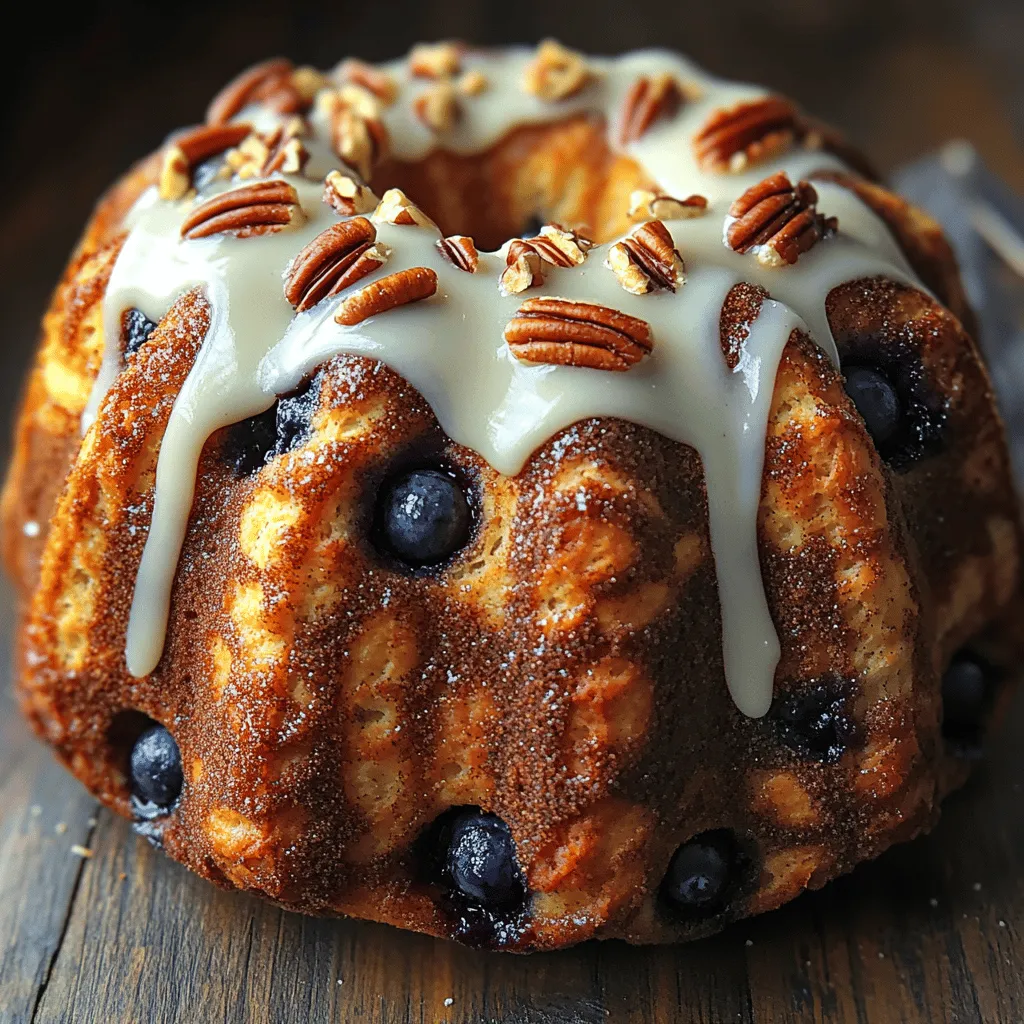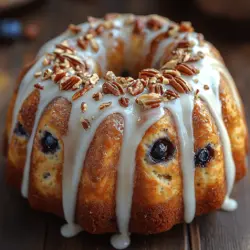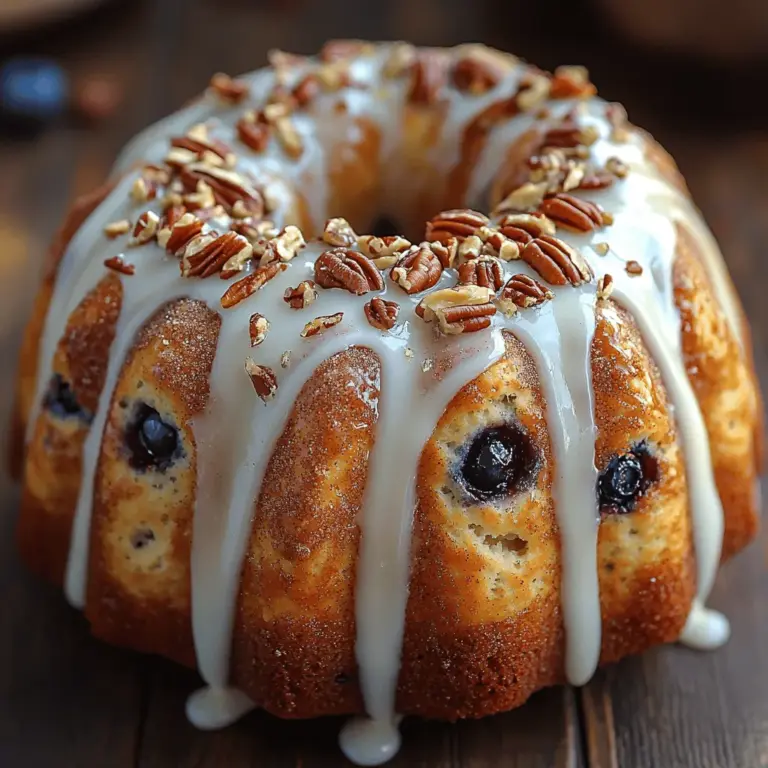Introduction
Bundt cakes have a special place in the hearts of many home bakers, combining elegance with simplicity. Their iconic ring shape not only makes them visually appealing but also allows for even baking, ensuring a delightful texture throughout. The Breakfast Biscuit Bundt Cake takes this classic dessert and flips it on its head, transforming everyday breakfast fare into a show-stopping centerpiece. By using biscuit dough as the base, this cake offers a unique twist that appeals to both traditionalists and adventurous eaters alike.
Imagine waking up to the warm, inviting aroma of cinnamon and sugar wafting through your kitchen, mingling with the buttery scent of freshly baked goods. The Breakfast Biscuit Bundt Cake is perfect for various occasions, whether it’s a cozy family breakfast, a brunch gathering with friends, or a festive holiday celebration. Its delightful combination of flavors and textures makes it a versatile dish that can be enjoyed at any time of day.
In this recipe, the soft and flaky biscuit dough is transformed into a moist cake, enhanced with a sweet cinnamon-sugar mixture that creates a heavenly swirl throughout. The cake is not only easy to prepare but also allows for creativity with optional ingredients like nuts and fruits, offering a personalized touch to suit your taste preferences.
Let’s dive into the ingredients that make this Breakfast Biscuit Bundt Cake an unforgettable treat.
Understanding the Ingredients
Refrigerated Biscuit Dough
At the heart of our Breakfast Biscuit Bundt Cake lies refrigerated biscuit dough. This convenient ingredient is a game changer for busy bakers, providing a quick and easy base without compromising on flavor or texture. The biscuit dough is light and flaky, which contributes to the cake’s tender crumb. When baked, it puffs up beautifully, creating a delightful contrast to the sweet cinnamon filling.
Using refrigerated biscuit dough also means you can whip up this cake in no time, making it an ideal option for those impromptu breakfast gatherings or lazy Sunday mornings when you want something special without the hassle.
Granulated Sugar and Cinnamon
No breakfast treat would be complete without the classic combination of granulated sugar and cinnamon. These two ingredients work together to elevate the flavor profile of the Bundt cake, infusing it with a sweet and aromatic essence that is sure to please. The granulated sugar adds a touch of sweetness that balances the richness of the butter, while the cinnamon brings warmth and depth to the cake, making each bite a comforting experience.
Unsalted Butter
Unsalted butter is another essential ingredient in this recipe, providing richness and moisture to the cake. It not only helps to enhance the flavor but also contributes to the cake’s tender texture. Using unsalted butter allows you to control the overall saltiness of the dish, ensuring that the flavors of the sugar and cinnamon shine through without competition.
Brown Sugar and Maple Syrup
To create a sticky, sweet base that holds the cake together, brown sugar and maple syrup play pivotal roles. Brown sugar introduces a hint of caramel flavor, thanks to its molasses content, adding complexity to the overall taste. Meanwhile, maple syrup brings a natural sweetness and a touch of earthiness, making it a perfect companion for the cinnamon and sugar. Together, these ingredients create a luscious filling that seeps into the biscuit layers, resulting in a moist and flavorful Bundt cake.
Optional Ingredients: Nuts and Fruit
For those who wish to add an extra layer of texture and nutritional benefits, consider incorporating optional ingredients such as nuts and fruit. Chopped pecans or walnuts can provide a delightful crunch, while fruits like blueberries or chopped apples can add moisture and a burst of freshness. These additions not only enhance the flavor but also allow you to customize the cake to suit your preferences. Plus, they can transform this breakfast treat into a more wholesome option, perfect for those looking to add a bit of nutrition to their morning routine.
Step-by-Step Preparation Guide
Prepping the Bundt Pan
The first step in creating your Breakfast Biscuit Bundt Cake is to prepare your Bundt pan. Proper greasing is crucial to ensure that the cake releases easily once baked. Start by using a generous amount of non-stick cooking spray or softened butter to coat the inside of the pan thoroughly. Pay special attention to the crevices and details of the Bundt design to prevent sticking.
For added assurance, you can also dust the greased pan with a light coating of flour, tapping out any excess. This extra step will create a barrier that further aids in the easy release of the cake, ensuring that your beautiful design remains intact.
Preparing the Biscuit Dough
Next, it’s time to handle the refrigerated biscuit dough. Open the package and gently separate the dough into individual biscuits. For this recipe, you will want to cut each biscuit into quarters. This step allows the dough to soak in the cinnamon-sugar mixture fully, ensuring that each piece is infused with flavor.
When working with refrigerated dough, it’s best to keep it cold until you’re ready to use it. This helps maintain the texture of the biscuits and makes them easier to handle. If the dough feels too sticky or soft, you can place it in the refrigerator for a few minutes to firm up before cutting.
Creating the Cinnamon-Sugar Mixture
Now that your biscuit pieces are ready, it’s time to create the cinnamon-sugar mixture. In a medium bowl, combine granulated sugar with ground cinnamon in a ratio of about 1 cup of sugar to 2 tablespoons of cinnamon. Feel free to adjust the amounts to suit your taste preferences—some may prefer a bit more cinnamon for a spicier kick.
Once mixed, take each quartered biscuit piece and coat it generously in the cinnamon-sugar mixture. This step is vital, as it ensures that every bite of the Bundt cake is bursting with flavor. The sugar not only adds sweetness but will also caramelize during baking, creating a beautifully golden crust on the outside of the cake.
Layering Techniques for the Bundt Cake
With your biscuit pieces coated and ready, it’s time to start layering them in the prepared Bundt pan. Begin by placing a layer of the coated biscuit pieces in the bottom of the pan. As you layer, sprinkle some of the brown sugar and maple syrup mixture over the biscuits to add moisture and sweetness.
Continue layering the biscuit pieces, alternating with the brown sugar and maple syrup mixture until all the biscuit dough is used. The key to achieving a beautifully swirled Bundt cake is to ensure an even distribution of the cinnamon-sugar mixture and the syrup throughout the layers.
Once you have completed your layers, gently press down on the biscuit pieces to compact them slightly, ensuring that your Bundt cake bakes evenly. This compacting step is essential, as it helps to meld the biscuit pieces together, creating that signature Bundt cake texture.
By following these steps, you are setting yourself up for a delightful Breakfast Biscuit Bundt Cake that not only looks impressive but tastes absolutely divine. Stay tuned for the next part of this article, where we will explore the baking process, cooling, and serving suggestions that will take your breakfast experience to the next level.

Layering for Texture and Flavor Distribution
When it comes to the Breakfast Biscuit Bundt Cake, the way you layer the ingredients is crucial to achieving the perfect texture and flavor distribution. Each layer contributes to the overall experience of the cake, ensuring that every bite is a delightful combination of flavors. For instance, when you alternate between the biscuit dough and your chosen fillings—such as fruits, nuts, or spices—the ingredients meld together during baking, creating pockets of flavor that enhance each slice. The layering technique not only adds visual appeal but also ensures that you enjoy a delightful balance of sweetness and richness throughout.
Customizing Layers with Fruits and Nuts
One of the best aspects of the Breakfast Biscuit Bundt Cake is its versatility. You can easily customize the layers to suit your taste preferences or seasonal availability. Consider adding fresh fruits such as blueberries, raspberries, or diced apples for a burst of natural sweetness and moisture. Nuts like chopped pecans or walnuts can add a satisfying crunch and depth of flavor. You might also experiment with spices like cinnamon, nutmeg, or even a hint of cardamom to elevate the cake’s aroma and taste profile.
Baking Instructions
Ideal Baking Conditions
Once you’ve layered your biscuit dough and fillings in the Bundt pan, it’s time to bake. Preheat your oven to 350°F (175°C). This temperature is ideal for ensuring a firm yet tender crumb, allowing the cake to rise beautifully without burning.
Checking for Doneness
Baking times can vary depending on your oven and the specific ingredients used. Generally, the Breakfast Biscuit Bundt Cake will need to bake for about 30 to 40 minutes. To check for doneness, insert a toothpick into the center of the cake; if it comes out clean or with a few moist crumbs, your cake is ready. Avoid overbaking, as this can lead to a dry texture.
The Science Behind Baking Times and Temperatures
Understanding the science behind baking can help you achieve a perfect rise and texture. The combination of baking powder and the moisture from the biscuit dough creates steam during baking, which contributes to the cake’s rise. The ideal temperature allows the outer crust to set while the inner cake continues to bake through. Maintaining consistent oven temperature is crucial; consider using an oven thermometer if you suspect your oven runs hot or cold.
Cooling and Glazing the Cake
Importance of Cooling Before Inverting
Once your Breakfast Biscuit Bundt Cake has finished baking, it’s essential to let it cool in the pan for about 10 to 15 minutes. This step is crucial; cooling allows the cake to firm up, making it easier to invert without breaking or sticking. If you rush this process and invert the cake while it’s still too hot, you risk damaging its beautiful shape.
Impact of Cooling on Texture and Ease of Serving
Cooling also impacts the texture of the cake. As it cools, the residual heat continues to cook the cake slightly, setting the crumb structure. A well-cooled cake will slice beautifully, allowing you to serve even portions without crumbling.
Preparing the Glaze
Once your cake has cooled sufficiently, it’s time to prepare the glaze. A simple glaze made from powdered sugar and milk or cream is a classic choice that adds a sweet finish. Simply whisk together 1 cup of powdered sugar with 2-3 tablespoons of milk until smooth. Drizzle this over the cooled cake for a touch of sweetness that complements the flavors inside.
Variations on the Basic Glaze
You can enhance the basic glaze in various ways to suit your flavor preferences. For a citrusy twist, add some lemon or orange juice and zest, which pairs wonderfully with fruits like blueberries or strawberries. Alternatively, infuse the glaze with vanilla extract for a richer flavor, or experiment with different extracts such as almond or maple for unique undertones.
Serving Suggestions
The Breakfast Biscuit Bundt Cake is a delightful addition to any breakfast or brunch spread. Here are some of the best ways to serve it:
1. Pairing with Coffee or Tea: This cake pairs beautifully with a hot cup of coffee or tea, making it an excellent choice for a leisurely morning. The cake’s flavors complement the bitterness of coffee or the warmth of herbal teas.
2. Garnishing with Fresh Fruit: For an extra pop of color and flavor, consider garnishing the slices with fresh fruit. Slices of strawberries, a handful of blueberries, or a sprinkle of raspberries can enhance the visual appeal and freshness of the cake.
3. Whipped Cream Accents: A dollop of whipped cream adds a luxurious touch. Consider lightly sweetening the cream with powdered sugar and a splash of vanilla for extra flavor.
Nutritional Information and Variations
Understanding the nutritional breakdown of your Breakfast Biscuit Bundt Cake can help you make informed choices. Each serving (approximately 1/12 of the cake) contains around 250 calories, 10 grams of fat, 35 grams of carbohydrates, and 3 grams of protein.
Healthier Substitutions and Gluten-Free Options
If you’re looking for healthier substitutions, consider using whole wheat flour instead of all-purpose flour to increase fiber content. You can also reduce the sugar slightly or substitute with a natural sweetener like honey or maple syrup. For a gluten-free option, use a 1:1 gluten-free baking flour blend, ensuring it contains xanthan gum for structure.
Seasonal Variations
This cake is incredibly adaptable to seasonal ingredients. In the fall, consider adding pumpkin puree and spices like cinnamon and nutmeg. In the summer, use fresh peaches or nectarines for a juicy, sweet twist. In winter, cranberries and orange zest create a festive flavor profile that’s perfect for holiday gatherings.
Conclusion
The Breakfast Biscuit Bundt Cake is not just a recipe; it’s a canvas for creativity and flavor exploration. Its versatility allows you to experiment with various fillings, glazes, and garnishes, making it suitable for any occasion. Whether you’re hosting a brunch or enjoying a quiet morning at home, this cake promises to be a beloved addition to your table.
Don’t hesitate to experiment with different flavors and share the joy of baking with family and friends. Each attempt will bring you closer to perfecting your version of this delightful dish. Happy baking!

